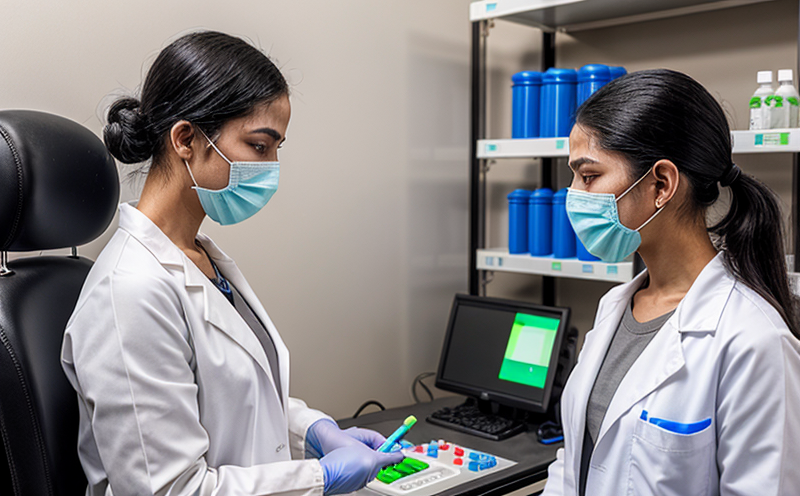Genotoxicity DNA Adduct Profiling Testing
In today’s highly regulated pharmaceutical industry, ensuring product safety is paramount. Genotoxicity testing evaluates whether a substance can cause damage to the genetic material (DNA) in cells, potentially leading to mutations and increasing the risk of cancer. Among various genotoxicity tests, DNA adduct profiling stands out for its ability to provide detailed insights into specific types of DNA damage.
DNA adducts are covalently bound chemical structures that can form on DNA when exposed to certain chemicals or environmental factors. These adducts are often precursors to mutations and are considered a hallmark of genotoxicity. By analyzing the types and locations of these adducts, researchers can identify potential mechanisms by which a compound may be toxic.
Our comprehensive Genotoxicity DNA Adduct Profiling Testing service utilizes advanced analytical techniques to quantify specific DNA adducts in various biological matrices. This testing is particularly crucial for understanding the genotoxic potential of pharmaceutical compounds during drug development, ensuring that new medications are safe for human use.
The process begins with sample preparation, where we extract DNA from relevant tissues or cells using standard protocols. We then apply a series of sophisticated analytical methods to detect and quantify adducts on the extracted DNA molecules. Depending on the compound being tested, we may use techniques such as liquid chromatography-tandem mass spectrometry (LC-MS/MS) for sensitive detection.
Once detected, these adducts are further characterized using high-resolution mass spectrometry to determine their chemical structures and locations within the DNA sequence. This detailed information helps in assessing the potential mutagenic effects of the compound under investigation. Our laboratories adhere strictly to international standards such as ISO/IEC 17025 for method validation, ensuring that all tests are conducted with precision and reliability.
The results of our genotoxicity DNA adduct profiling testing provide valuable insights into the safety profile of pharmaceutical compounds during preclinical development stages. Regulatory bodies like the US Food and Drug Administration (FDA) and European Medicines Agency (EMA) require such data to evaluate the risks associated with new drugs.
Our service not only supports drug developers in meeting regulatory requirements but also aids in identifying potential safety issues early in the development process, thereby reducing costly failures at later stages. By leveraging cutting-edge technology and adhering strictly to scientific protocols, we ensure that our clients receive accurate, reliable, and actionable results.
- Sample Preparation: Extraction of DNA from tissues or cells using standardized methods.
- Analytical Techniques: Use of LC-MS/MS for sensitive detection followed by high-resolution mass spectrometry for structural characterization.
Applied Standards
The genotoxicity DNA adduct profiling testing is conducted in accordance with several internationally recognized standards to ensure accuracy and reliability. These include:
- ISO/IEC 17025: Ensures that the laboratory complies with specific requirements for technical competence.
- ASTM E2698: Provides guidance on the use of LC-MS/MS for genotoxicity testing.
- OECD Guideline 487: Offers a standardized protocol for in vitro DNA-repair test using mammalian cells.
The application of these standards guarantees that our results are comparable with those from other reputable laboratories and comply with regulatory expectations. This consistency is critical for pharmaceutical companies seeking to navigate the complex landscape of drug development and regulatory approval.
Quality and Reliability Assurance
- Method Validation: Rigorous validation processes ensure that analytical methods are fit for purpose across all testing parameters.
- Inter-laboratory Comparisons: Regular participation in proficiency tests ensures continuous quality control and reliability of results.
Our commitment to maintaining high-quality standards is reflected in our robust Quality Management System (QMS). This system encompasses strict adherence to ISO/IEC 17025, ensuring that all testing procedures are validated and optimized for accuracy. We also participate in inter-laboratory comparisons organized by regulatory bodies and recognized organizations to further validate the reliability of our results.
Moreover, we employ experienced scientists who are trained in the latest methodologies and technologies used in genotoxicity testing. Their expertise ensures that each test is conducted with precision and that any anomalies or discrepancies are promptly addressed. Our ongoing efforts in quality assurance contribute significantly to the trustworthiness of our services.
Competitive Advantage and Market Impact
- Predictive Insights: Early identification of potential genotoxic risks allows for informed decision-making in drug development, potentially saving time and resources.
- Regulatory Compliance: Meeting stringent regulatory standards ensures a smoother path to market approval.
In an increasingly competitive pharmaceutical landscape, our Genotoxicity DNA Adduct Profiling Testing service offers significant advantages. By providing early-stage insights into potential genotoxic effects, we enable clients to make informed decisions about which compounds to pursue further in clinical trials. This proactive approach can lead to reduced development costs and accelerated time-to-market.
Furthermore, our adherence to stringent regulatory standards enhances the credibility of our clients' products among regulators and the public alike. In an era where consumer trust is paramount, this reliability can be a decisive factor in market positioning and customer satisfaction. Our service not only supports the development of safe pharmaceuticals but also contributes positively to the reputation of our clients.





